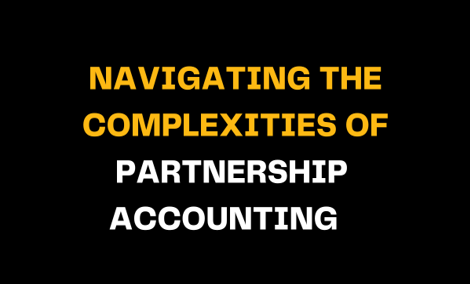Read Time4 Mins
Partnership accounting can be a challenging and intricate task that requires careful attention to detail and a deep understanding of financial principles. Whether you are starting a new partnership or managing an existing one, effectively navigating the complexities of partnership accounting is essential for the success of your business.
We will explore the intricacies of partnership accounting and provide valuable insights to help you navigate this critical area of business management with confidence.
1.Partnership Accounting: An Overview
Partnership accounting involves tracking and managing the Financial Management Software of a partnership, which is a business organization where two or more individuals share ownership and control. Unlike other business structures, partnerships come with unique challenges when it comes to managing finances due to the shared nature of ownership and decision-making.
2.Tracking Contributions and Distributions
A key aspect of partnership accounting is keeping track of the contributions and distributions made by each partner. When partners join a business, they typically make contributions such as cash, property, or services, which are used to fund the operations and generate revenue. As the business earns profits, partners receive distributions based on their ownership percentages. Implementing a robust system to record and monitor these transactions is crucial for maintaining transparency and fairness.
3.Navigating Tax Planning Challenges
Partnerships are considered pass-through entities, meaning that the business’s profits and losses flow through to the partners’ personal tax returns. This can lead to complex tax implications, especially when there are multiple partners with different ownership percentages. To navigate these challenges, it is important to work closely with a qualified accountant or tax professional who can help you understand the tax implications of your partnership structure. They can assist in developing a tax planning strategy that maximizes your tax benefits while minimizing your liabilities.
4.Managing Financial Statements
Accurate and up-to-date financial statements are essential for partnership accounting. These statements, including the income statement, balance sheet, and statement of cash flows, provide a comprehensive snapshot of the partnership’s financial health. It is crucial to develop a thorough understanding of these financial statements and how they relate to the overall financial health of the partnership. Collaborating with an accountant can help you establish a systematic approach to preparing and reviewing these statements regularly, ensuring that you have the most current financial reports for partnership to guide your business decisions.
5.Effective Communication and Collaboration
Effective communication and collaboration among partners are vital for successful partnership accounting. Partnerships are built on shared responsibility and trust, and maintaining open lines of communication is crucial to ensure that all partners are on the same page when it comes to managing the partnership’s finances. Regular meetings and check-ins can be scheduled to review financial statements, discuss upcoming decisions or challenges, and foster a culture of transparency and trust.
Conclusion: Navigating the complexities of partnership accounting is a challenging but necessary endeavor for the success of any partnership. By understanding partnership accounting principles, effectively tracking contributions and distributions, addressing tax planning challenges, managing financial statements, and fostering effective communication and collaboration among partners, you can overcome obstacles and steer your business towards financial success. Seeking professional guidance from an accountant or tax professional and implementing best practices will help you navigate partnership accounting with confidence and achieve your business goals.







